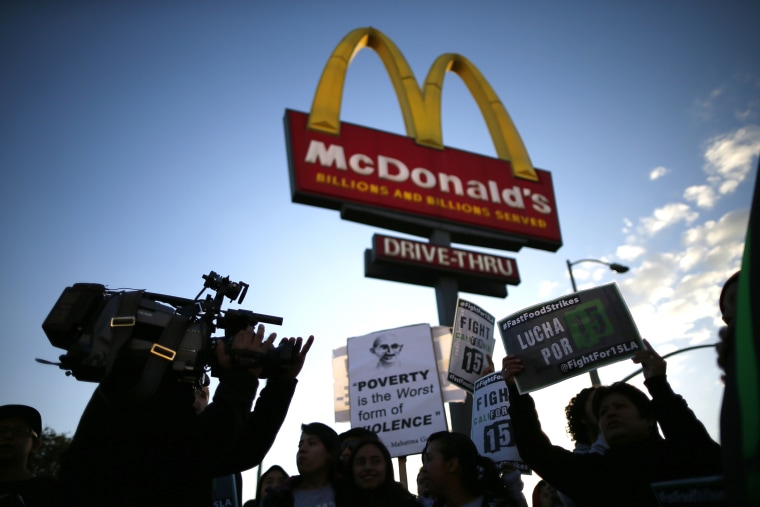In late 2012, fast food workers and organizers in New York orchestrated what was then the largest strike in the industry's history, with a turnout in excess of 200 employees. Over the course of the next year, the burgeoning fast food workers' movement attracted headlines through a series of increasingly massive labor actions, culminating in a nationwide, 100-city work stoppage.
And then, for four months, the movement went dormant. Organizers promised more displays of militancy in 2014, but none were forthcoming in the first quarter of the year. Those outside the movement were left waiting to see what the next move would be.
On Thursday, the strikers made their first new play of 2014. But this time, it wasn't a strike: Instead, fast food workers and their supporters announced that they would take their struggle to the courts. Workers at McDonald's have filed class action lawsuits in Michigan, New York and California alleging that the fast food giant systematically steals wages from its employees.
"I used to think McDonald's grew so big because of quality and integrity," said Jason Hughes, one of the plaintiffs on the California lawsuit, during a Thursday conference call with reporters. "Instead I learned it's because of cutting cost corners and squeezing workers."
According to the lawsuits, McDonald's engaged in several different forms of wage theft, including requiring employees to perform unpaid work, denying them overtime, preventing them from taking meal breaks and forcing them to purchase their own uniforms. The plaintiffs are targeting both individual McDonald's franchisees and the multinational corporation itself, which directly operates some of the locations identified in the lawsuits. Even in franchised locations, attorneys for the plaintiffs allege that McDonald's Corp. is liable for wage theft.
"We've found evidence that McDonald's has exerted control of the operations of these franchise restaurants, [and] that makes it legally, jointly responsible," said attorney Joseph Sellers on the conference call.
McDonald's suggested otherwise in a statement emailed to msnbc.
“McDonald’s and our independent owner-operators share a concern and commitment to the well-being and fair treatment of all people who work in McDonald’s restaurants," said Heidi Barker Sa Shekhem, McDonald's Corp.'s vice president of global external communications, in the statement. "We are currently reviewing the allegations in the lawsuits. McDonald’s and our independent franchisees are committed to undertaking a comprehensive investigation of the allegations and will take any necessary actions as they apply to our respective organizations.”
But the plaintiffs argue that wage theft is the result of structural issues in the McDonald's business model, and not just the product of some isolated bad behavior. In the complaint filed in Michigan's Eastern District Court, the plaintiffs write that McDonald's corporate headquarters sets "labor cost percentage targets" for franchisees and admonishes them to drive down labor costs until they hit those goals.
Labor law expert Gordon Lafer, a professor at the University of Oregon, told msnbc that It's important to somehow reach the parent corporation" when alleging wage theft against a franchised chain.
"The money is really at the parent corporation in many cases and not the franchisee, and it's important to reach the corporation in order to make fair pay affordable," he said.
Wage theft is endemic to low-wage industries, according to research conducted by the National Employment Law Project (NELP). A 2008 NELP survey of 4,387 low-wage workers across the country found that 68% had "experienced at least one pay-related violation in the previous work week."
